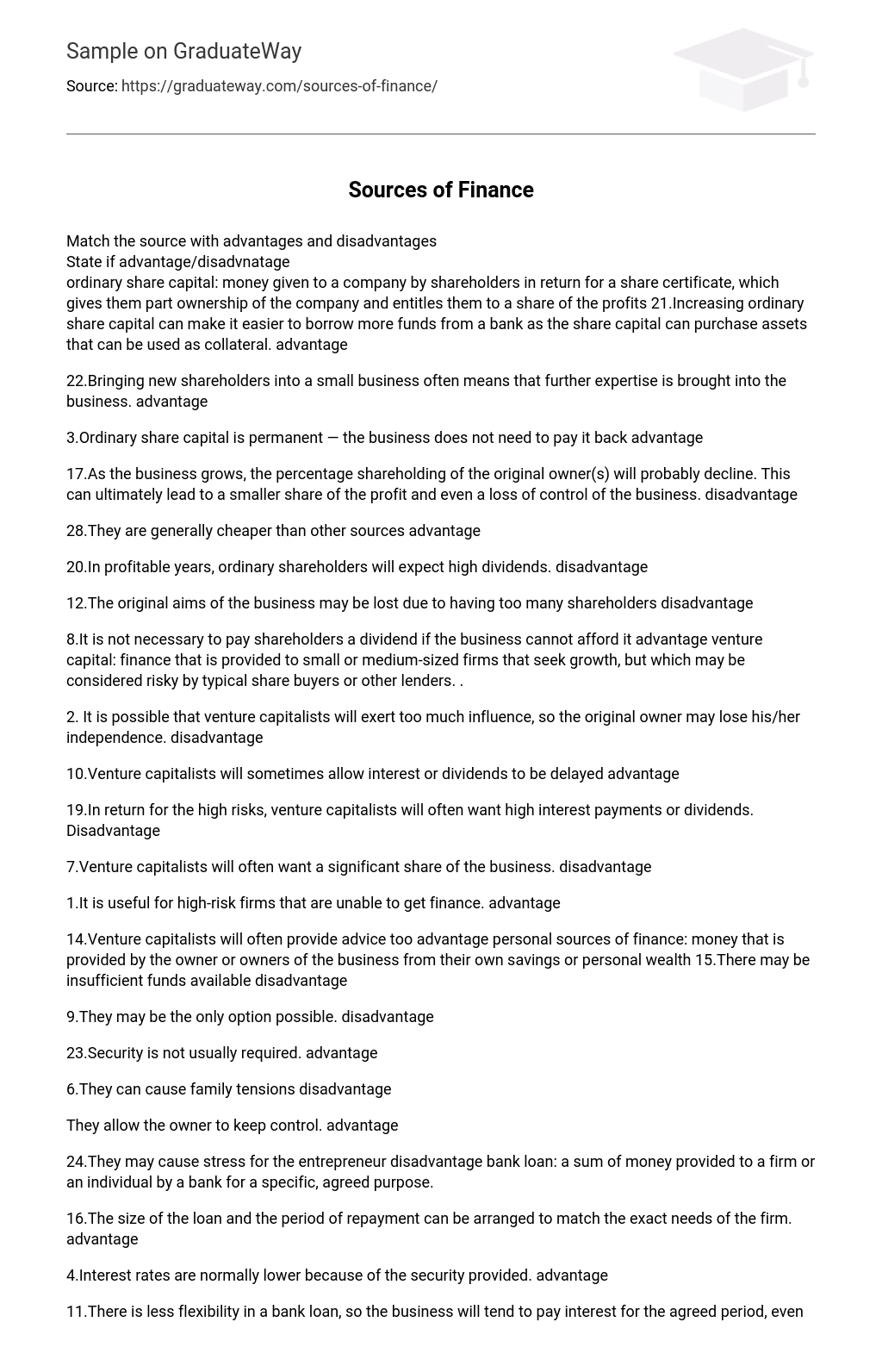Match the source with advantages and disadvantages
State if advantage/disadvnatage
ordinary share capital: money given to a company by shareholders in return for a share certificate, which gives them part ownership of the company and entitles them to a share of the profits 21.Increasing ordinary share capital can make it easier to borrow more funds from a bank as the share capital can purchase assets that can be used as collateral. advantage
22.Bringing new shareholders into a small business often means that further expertise is brought into the business. advantage
3.Ordinary share capital is permanent — the business does not need to pay it back advantage
17.As the business grows, the percentage shareholding of the original owner(s) will probably decline. This can ultimately lead to a smaller share of the profit and even a loss of control of the business. disadvantage
28.They are generally cheaper than other sources advantage
20.In profitable years, ordinary shareholders will expect high dividends. disadvantage
12.The original aims of the business may be lost due to having too many shareholders disadvantage
8.It is not necessary to pay shareholders a dividend if the business cannot afford it advantage venture capital: finance that is provided to small or medium-sized firms that seek growth, but which may be considered risky by typical share buyers or other lenders. .
2. It is possible that venture capitalists will exert too much influence, so the original owner may lose his/her independence. disadvantage
10.Venture capitalists will sometimes allow interest or dividends to be delayed advantage
19.In return for the high risks, venture capitalists will often want high interest payments or dividends. Disadvantage
7.Venture capitalists will often want a significant share of the business. disadvantage
1.It is useful for high-risk firms that are unable to get finance. advantage
14.Venture capitalists will often provide advice too advantage personal sources of finance: money that is provided by the owner or owners of the business from their own savings or personal wealth 15.There may be insufficient funds available disadvantage
9.They may be the only option possible. disadvantage
23.Security is not usually required. advantage
6.They can cause family tensions disadvantage
They allow the owner to keep control. advantage
24.They may cause stress for the entrepreneur disadvantage bank loan: a sum of money provided to a firm or an individual by a bank for a specific, agreed purpose.
16.The size of the loan and the period of repayment can be arranged to match the exact needs of the firm. advantage
4.Interest rates are normally lower because of the security provided. advantage
11.There is less flexibility in a bank loan, so the business will tend to pay interest for the agreed period, even if it gets into a position where it can pay off the loan early.
disadvantage
27.It is more expensive than alternatives such as personal finance.
disadvantage
26.The interest rate and thus the repayments are fixed in advance, making it easy to budget the schedule for repayments. advantage
25.The size of the loan may be limited by the amount of collateral that can be provided rather than by the amount of money needed by the business. disadvantage
bank overdraft: when a bank allows an individual or organisation to overspend on a current account held with the bank up to an agreed (overdraft) limit and for a stated time period 18.Banks can demand immediate repayment (although this is rare). disadvantage
13.Interest is only paid on the amount of the overdraft being used rather than the maximum level allowed. advantage
5.They are extremely flexible and can even be used for a single day if the
business has a temporary cash-flow problem. advantage
29.Particularly useful to seasonal businesses, which are likely to experience some cash-flow problems at certain times of the year. advantage
30.The interest rate charged is usually higher than for a loan. disadvantage





